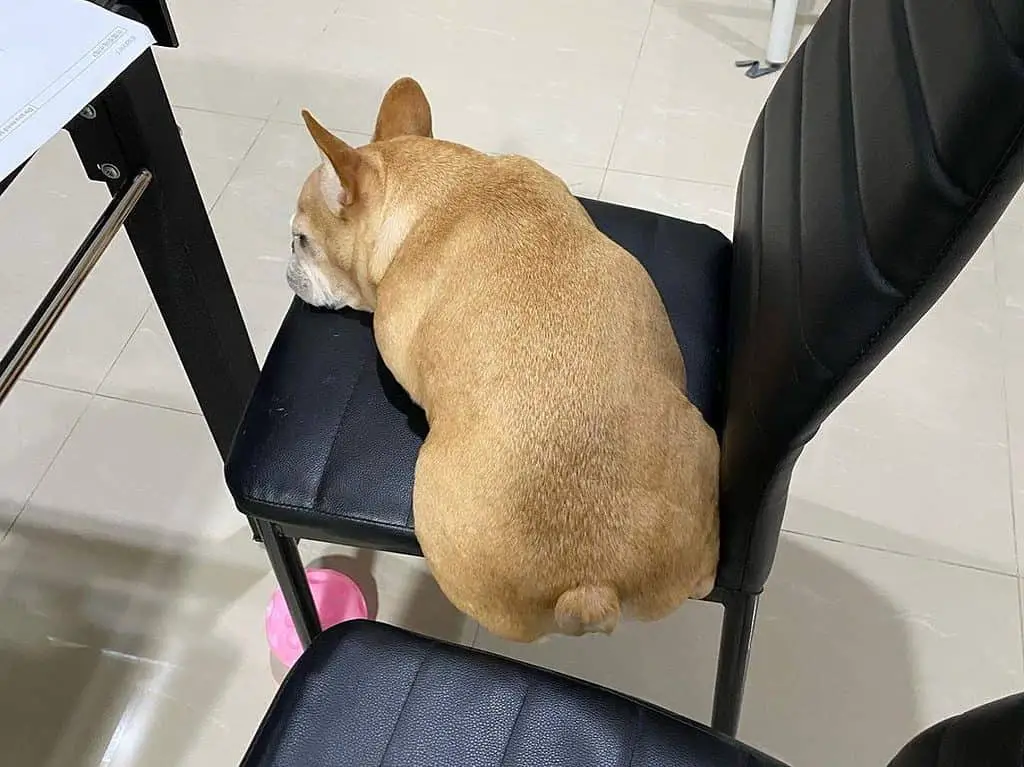You’re cuddling your pup and notice he smells differently… something metallic. You pause and ask yourself: why does my dog smell like iron?
It’s certainly a confusing and alarming experience, but before you panic, understand the different possibilities so that you can help your beloved pet accordingly.
Why Does My Dog’s Breath Smell Like Metal

Dog Has Ulcer
A sore or hole in the stomach or intestine’s lining is called an ulcer, and if your pup has one, it could explain why they’ve been acting strangely and why their breath smells like iron.
It’s not always easy to detect an ulcer in your furry friend. But if your pooch is showing signs like decreased appetite, weight loss, vomiting and bad breath, these may all be symptoms of the condition. And, of course, that metallic smell!
Don’t let your pup suffer in silence; if you suspect they have an ulcer, take them to the vet immediately.
Dog Has Dental Issues
In the case of puppies, the metallic smell is all due to their teething stage. This is perfectly normal and usually goes away once your pup’s permanent adult teeth are fully grown and settled.
On the other hand, the cause for the metallic smell in dogs’ breath could be plaque build-up and the presence of oral bacteria. Poor dental hygiene and a diet lacking essential nutrients can contribute to this problem and specific health conditions or medications.
The good news is there are simple steps you can take to help reduce the bad odor from your pet’s mouth.
Start by brushing their teeth regularly with toothpaste designed specifically for dogs. Regular human toothpaste isn’t recommended since it contains ingredients that can upset the digestive system when swallowed.
Alternatively, look at their teeth and gums. If there is swelling or redness, then it’s very likely that your dog has an infection. You should visit the vet as soon as possible for a diagnosis and discuss treatment options. The vet may recommend antibiotics or even tooth extraction in severe cases.
Why Does My Dog’s Pee and Vomit Smell Like Metal

Dog Has Kidney Disease
When the kidneys cannot filter out toxins from the body properly, the waste builds up in their system, including a chemical called uremia which has an intense metallic smell.
Other symptoms like excessive thirst or urination, weight loss, vomiting, or diarrhea can indicate kidney problems and should be monitored closely.
If you suspect your dog might be suffering from kidney disease, take them to a veterinarian immediately, as early intervention can make a huge difference in successfully treating the illness. Treatment of kidney disease will depend on what stage the condition is at when diagnosed.
Kidney disease in dogs can cause further health complications such as high blood pressure, urinary tract inflammation, dehydration, and organ failure if left untreated.
Dog Has Urinary Tract Infection (UTI)
If you’ve noticed an unpleasant smell emanating from your pup that resembles iron, chances are they may have a UTI.
The most common culprit for UTI is bacteria from the skin or anal area making its way into the urethra, but other factors like stones or tumors can also be to blame.
Look out for frequent urination, often accompanied by pain or difficulty. If your pup has been licking its private area excessively, this could also be a sign of infection. You may even notice bloody or cloudy urine traces when your pooch goes to do its business.
Additionally, if your pup produces less urine than usual, this could be another clue that something isn’t right.
Fortunately, there are many options for treating UTIs in dogs. One of the most effective treatments is antibiotics, killing the bacteria that cause the infection. Antibiotics are usually given orally or intravenously, depending on the severity of the infection. A veterinarian should always prescribe them to ensure they are safe and effective for your pup’s unique needs.
Why Does My Dog’s Skin Smell Like Metal

Dog Has Impacted Anal Gland
Anal glands in dogs are tiny, pea-sized sacs on either side of the anus. These glands
help to produce a unique scent that helps dogs identify one another. When these glands become impacted, they fill up with fluid, bacteria and other debris, emitting an unpleasant metallic odor. Some dog owners describe this smell as fishy, and the AKC couldn’t agree more.
So why do anal glands get blocked and fill up? The answer is not clear-cut; however, there are many possible causes.
One reason could be an infection caused by bacteria or parasites in the anal region, leading to inflammation and swelling of the anal sacs, which prevents them from emptying properly.
It can also happen when dog poop becomes too dry and hard, causing the material inside to back up into the glands instead of coming out naturally. This is usually the case in dogs with a diet lacking fiber.
Additionally, genetics plays a role, as some breeds are more prone to anal gland problems than others. This can be further complicated by obesity which adds extra pressure on the area, causing the glands to become blocked even faster.
In addition to the metallic smell, the signs that a dog’s anal glands are blocked include scooting on the floor and excessive licking or biting at their hind area.
Treating impacted anal glands in dogs typically involves expressing or draining the fluid manually through gentle pressure applied around your pup’s rectum or administering medication such as antibiotics to reduce inflammation and infection if present.
Dog Is In Heat
When it comes to a dog in heat, their behavior and odors can be concerning. Some pet owners ask themselves during this time, why does my dog smell like iron?
Female dogs typically go into heat between 6 and 12 months, during which their bodies produce hormones that cause a distinct metallic odor to emit from their body. Depending on the dog’s size, this odor can last anywhere from one week to three weeks. During this time, all the air around you has been replaced with a strong whiff of metal.
An essential factor in caring for your pup during this time is ensuring she’s comfortable. Pay attention to her behavior and look for signs that indicate she’s feeling anxious or agitated. If this is the case, provide her with extra love and comfort by giving her more cuddles than usual.
Moreover, setting up an area with soft bedding away from other pets will help keep your pup safe and relaxed while she’s going through this significant change.
Dog Has Vaginitis
If your dog has suddenly become a smellier version of her former self, it’s time to take a closer look at what could be happening. One possible cause is vaginitis, an inflammation of the vagina in female dogs. Vaginitis can have many causes and can lead to unpleasant smells that may remind you of iron.
Symptoms include scooting, excessive licking at the affected area, discharge from the vagina, inflammation and redness of the vaginal area, and increased need for urination. If you notice these signs or suspect your dog has vaginitis, immediately take them to a vet.
Dog Has Pyometra
This refers to a uterus infection that occurs mainly in unspayed female dogs after they have gone through their heat cycle. It is life-threatening and requires immediate veterinary attention.
Unlike other infections, the symptoms of pyometra are usually subtle and not easily recognized by owners. Dogs often display lethargy or depression, decreased appetite, increased drinking, vomiting, abdominal distension and a foul-smelling discharge from their vulva that smell like iron.
It is life-threatening and requires immediate veterinary attention. The sooner you take your dog to the vet, the better her chance of survival.
Why Does My Dog’s Blood Smell Like Metal
Dog Has Metritis
Metritis is an inflammation of the uterus and can affect female dogs who have recently given birth. If a dog has this genital infection, it may develop a distinct smell (from discharges of blood in the vulva). The discharges can also be in the form of mucus or pus.
The common causes for this condition include the leftover placenta inside the uterus, non-sterile artificial insemination, prolonged labor or delivery, abortion, birthing a large litter, and miscarriage.
Besides the metallic smell from the dog’s vagina, you can also expect the following symptoms: increased heart rate, dark and red gums, swollen abdomen, lack of appetite, dehydration, depression, and fever.
Veterinarians typically recommend a combination of antibiotics and anti-inflammatories to reduce the infection and decrease swelling. Surgery may also be necessary if there are signs of necrosis (tissue death) within the uterus.
What To Do If My Dog Smells Like Iron
The next time you notice that your pooch smells like iron, take a closer look and check if he is injured (blood usually produces a metallic scent). If there are no signs of blood, consider bathing your dog and brushing his teeth.
If the metallic smell persists, your dog may be in heat or may have one of the following:
- ulcer;
- dental issues;
- kidney disease;
- urinary tract infection;
- impacted anal gland;
- vaginitis;
- pyometra; and
- metritis.
Check with your veterinarian for confirmation and the best course of action.
Related Questions
Why do dogs’ anal glands smell?
Dogs have special sacs near their anus that contain scent-producing oils, which they use as territorial markers. Every time your pup poops, this scent helps mark territory and identify who has passed through an area as well.
Should I be worried if my dog’s butt smells like iron?
If your dog’s butt smells like iron, the culprit is usually an impacted anal gland. This condition is not life-threatening, so there’s no need to worry and panic. Your vet may recommend manual expression of the enlarged sacs to relieve pressure and odor.




